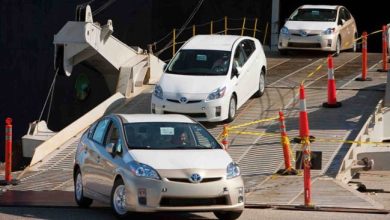Tourism returns to Europe, but along comes overcrowding

Europe’s tourism industry has bounced back from a sharp decline during the coronavirus pandemic – but mass tourism and overcrowding are putting communities under pressure.
After the COVID-19 slump, the tourism industry across Europe recovered in 2023 and 2024, drawing close to pre-pandemic levels and even surpassing them in some countries.
In the first quarter of 2024, there were 452.6 million overnight stays in tourist accommodations across the European Union, marking a 7% increase compared with the same quarter of 2023, according to data released by the European Commission last week.
Foreign visitors accounted for approximately 45% of all overnight stays in the first three months of 2024, but there were large differences among EU countries. The biggest share of foreign visitors staying was recorded in Malta (91%), the Greek Cypriot administration (87%), Luxembourg (82%) and Austria (78%).
At the other end of the ranking are Germany, Romania and Poland – all geographically large countries – with a share of foreign overnight stays of around 20%.
Derided as “Club Med” nations during the European debt crisis 15 years ago, the economies of Spain, Greece and Portugal are now outperforming their northern peers – thanks to a rebound in tourism.
The three nations had to endure harsh austerity measures imposed by their European Union partners, who were quick to blame their fiscal laxity and lack of competitiveness for their economic woes.
But “the situation has changed” since the COVID-19 pandemic ended, said Zsolt Darvas, an economist at Bruegel, a Brussels-based think tank. “Today, those countries are growing faster than the European Union average; they are no longer seen as black sheep.”
Slovenian tourism also posted record results last year, despite devastating floods in early August. The country, which has about 2.1 million inhabitants, welcomed 6.2 million tourists, up 5.5% compared to 2022 and only 0.6% less than in 2019, before the pandemic.
Challenges
However, tourism in Europe has faced a number of challenges in recent years, one of which is a chronic shortage of staff.
In Austria, for example, the management consulting company Deloitte has examined the state of tourism with the Austrian Hoteliers Association (ÖHV). According to the report, high costs, staff shortages, and the weak economy are a burden.
In North Macedonia, the number of tourists in the period from January through April rose by 15.3% compared to the same time last year, and the number of overnight stays increased by 15.2%. A majority of visitors came from Türkiye, Germany, Serbia, Greece, Bulgaria, Croatia and Slovenia.
The country’s Agency for Promotion and Support of Tourism (APPT) is working to implement a cross-border cooperation project with Greece, funded through the EU’s Instrument for Pre-Accession Assistance (IPA). These funds support countries in line to join the EU, such as North Macedonia.
Neighboring Albania was visited by 10.1 million tourists last year, an increase of 35% compared to 2022.
The upward trend continued in the first months of 2024, when about 974,000 foreign tourists visited Albania during May alone, bringing the total count to more than 3.3 million in the first five months of the year.
Polina Karastoyanova, head of the National Tourism Board of Bulgaria, said during a conference in Sofia that it is important for the country as a tourist destination to become part of the eurozone. She added that the tourism industry is one of the few sectors in Bulgaria that has the potential to double its size.
Similarly, Mislav Brkic of the Croatian National Bank argued at another conference that countries like Croatia – which joined the eurozone in 2023 – have the most to gain from being a part of the currency union. He said that by adopting the euro, his country became safer for the markets, and there would be a positive impact on tourism as well.
Tourism in Croatia is a major contributor to the country’s economy, accounting for almost 20% of gross domestic product (GDP). According to data published by the European Commission, Croatia ranked second in terms of the increase in foreign overnight stays in the first quarter of 2024: a 22% increase compared to the same period last year.
Growing resentment
Rising tourism may be good for the economy, but overcrowding is causing growing resentment among the residents of popular hot spots across the continent.
Websites such as Airbnb add to the problem with illegal rentals and pressure on the housing market, according to members of the European Parliament.
In Italian destinations such as Venice, Rome, and parts of Tuscany, residents are calling for the flow of visitors to be taken under control. Venice recently introduced an entrance fee for day trips.
In Palma on the Spanish island of Mallorca, city Mayor Jaime Martinez has presented plans to control mass tourism in the city center. The most sweeping proposal is a ban on creating any more rental space for tourists, local media reported. He also suggests introducing regulations to curb the rental of properties to foreigners.
In the Netherlands, Amsterdam also saw a rise in visitors in 2023 compared to the previous year, with some 60% coming from within the Netherlands and the rest from abroad.
The city expects the number of tourists to continue to rise. “The flow of visitors puts pressure on facilities and, in particular, the city center is often too crowded,” says a statement issued by the municipality.
In March, EU ministers gave their final approval to a regulation requiring platforms to share data on landlords with municipalities, among others. This will allow local officials to take stricter action if landlords do not comply with the rules.






